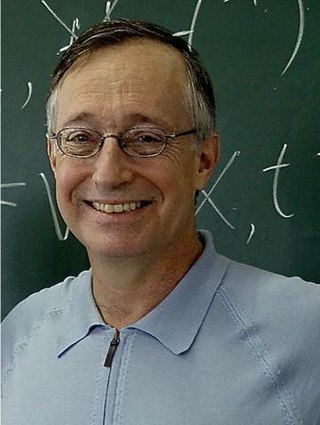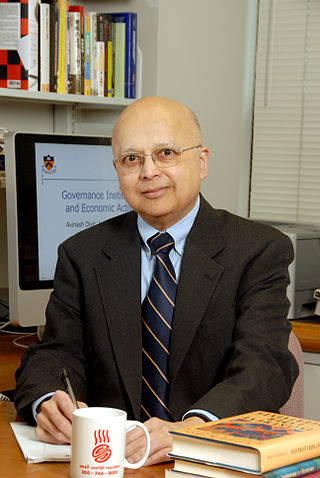
Microeconomics is a branch of economics that studies the behavior of individuals and firms in making decisions regarding the allocation of scarce resources and the interactions among these individuals and firms. Microeconomics focuses on the study of individual markets, sectors, or industries as opposed to the national economy as a whole, which is studied in macroeconomics.

Kenneth Joseph Arrow was an American economist, mathematician, writer, and political theorist. Along with John Hicks, he won the Nobel Memorial Prize in Economic Sciences in 1972.
An economist is a professional and practitioner in the social science discipline of economics.

Robert Emerson Lucas Jr. was an American economist at the University of Chicago. Widely regarded as the central figure in the development of the new classical approach to macroeconomics, he received the Nobel Prize in Economics in 1995 "for having developed and applied the hypothesis of rational expectations, and thereby having transformed macroeconomic analysis and deepened our understanding of economic policy". He was characterized by N. Gregory Mankiw as "the most influential macroeconomist of the last quarter of the 20th century". In 2020, he ranked as the 10th most cited economist in the world.

Vernon Lomax Smith is an American economist and professor of business economics and law at Chapman University. He was formerly a professor of economics at the University of Arizona, professor of economics and law at George Mason University, and a board member of the Mercatus Center. Along with Daniel Kahneman, Smith shared the 2002 Nobel Memorial Prize in Economic Sciences for his contributions to behavioral economics and his work in the field of experimental economics. He worked to establish 'laboratory experiments as a tool in empirical economic analysis, especially in the study of alternative market mechanisms'.

Paul Robert Milgrom is an American economist. He is the Shirley and Leonard Ely Professor of Humanities and Sciences at the Stanford University School of Humanities and Sciences, a position he has held since 1987. He is a professor in the Stanford School of Engineering as well and a Senior Fellow at the Stanford Institute for Economic Research. Milgrom is an expert in game theory, specifically auction theory and pricing strategies. He is the winner of the 2020 Nobel Memorial Prize in Economic Sciences, together with Robert B. Wilson, "for improvements to auction theory and inventions of new auction formats".

Ariel Rubinstein is an Israeli economist who works in economic theory, game theory and bounded rationality.
Philosophy and economics studies topics such as public economics, behavioural economics, rationality, justice, history of economic thought, rational choice, the appraisal of economic outcomes, institutions and processes, the status of highly idealized economic models, the ontology of economic phenomena and the possibilities of acquiring knowledge of them.
Jean-Jacques Marcel Laffont was a French economist specializing in public economics and information economics. Educated at the University of Toulouse and the Ecole Nationale de la Statistique et de l'Administration Economique (ENSAE) in Paris, he was awarded PhD in economics by Harvard University in 1975.

Jonathan David Levin is an American economist and academic. He is currently the Philip H. Knight Professor and Dean of the Stanford Graduate School of Business. On April 4, 2024, the Stanford University Board of Trustees announced Levin would become Stanford's 13th president, effective August 1, 2024.

Avinash Kamalakar Dixit is an Indian-American economist. He is the John J. F. Sherrerd '52 University Professor of Economics Emeritus at Princeton University, and has been Distinguished Adjunct Professor of Economics at Lingnan University, senior research fellow at Nuffield College, Oxford and Sanjaya Lall Senior Visiting Research Fellow at Green Templeton College, Oxford.

Samuel Stebbins Bowles, is an American economist and Professor Emeritus at the University of Massachusetts Amherst, where he continues to teach courses on microeconomics and the theory of institutions. His work belongs to the neo-Marxian tradition of economic thought. However, his perspective on economics is eclectic and draws on various schools of thought, including what he and others refer to as post-Walrasian economics.

Robert Burton Ekelund Jr. was an American economist.
Robert Butler "Bob" Wilson, Jr. is an American economist and the Adams Distinguished Professor of Management, Emeritus at Stanford University. He was jointly awarded the 2020 Nobel Memorial Prize in Economic Sciences, together with his Stanford colleague and former student Paul R. Milgrom, "for improvements to auction theory and inventions of new auction formats". Two more of his students, Alvin E. Roth and Bengt Holmström, are also Nobel Laureates in their own right.
Donald John Roberts is a Canadian-American economist, and John H. and Irene S. Scully Professor of Economics, Strategic Management and International Business at the Stanford Graduate School of Business.
John Michael Harrison is an American researcher, known for his contributions to the theory of operations research, in particular stochastic networks and financial engineering. He has authored two books and nearly 90 journal articles.
Ross Marc Starr is an American economist who specializes in microeconomic theory, monetary economics and mathematical economics. He is a professor at the University of California, San Diego.
B. Douglas Bernheim is an American professor of Economics, currently the Edward Ames Edmunds Professor of Economics at Stanford University; his previous academic appointments have included an endowed chair in Economics and Business Policy at Princeton University and an endowed chair in Insurance and Risk Management at Northwestern University’s J.L. Kellogg Graduate School of Management, Department of Finance. He has published many articles in academic journals, and has received a number of awards recognizing his contributions to the field of economics. He is a partner with Bates White, LLC an economic consulting firm with offices in Washington, D.C., and San Diego, California.
The Nancy L. Schwartz Memorial Lecture is a series of public lectures held every year by the Kellogg Department of Managerial Economics and Decision Sciences of Northwestern University.
The 2020 Nobel Memorial Prize in Economic Sciences was awarded jointly to the American economists Paul Milgrom and Robert B. Wilson "for improvements to auction theory and inventions of new auction formats." According to the Nobel Committee, the recognition was given because "their theoretical discoveries have improved auctions in practice." Furthermore, Secretary Hansson said:
"This year's Laureates, Paul Milgrom and Robert Wilson, have studied how auctions work. They have also used their insights to design new auction formats for goods and services that are difficult to sell in a traditional way, such as radio frequencies. Their discoveries have benefitted sellers, buyers and taxpayers around the world."









